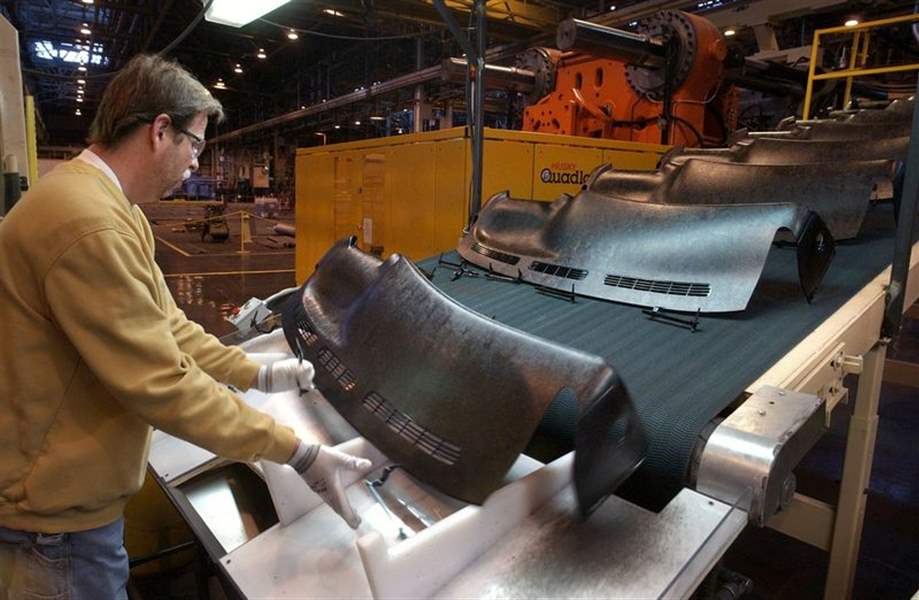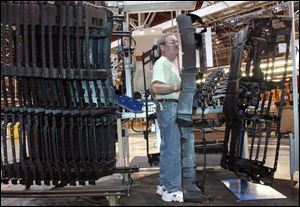
Spin-offs seek traction
2/1/2004
Mark Morris retrieves a component at the Adrian, Mich., Delphi plant, which is to make dashboards for two upcoming pickup-truck models.
zapotosky / blade

Mark Morris retrieves a component at the Adrian, Mich., Delphi plant, which is to make dashboards for two upcoming pickup-truck models.
ADRIAN - Parking is plentiful outside Adrian's sprawling Delphi Corp. factory, which has less than half the employees it did when the parts supplier was spun off from General Motors Corp. a few years ago.
The 470-employee plant continues to supply instrument panels to GM - workers recently were reassured by word they will make dashboards for the upcoming replacements for the popular Chevrolet Silverado and GMC Sierra pickups - but it has been unable to get much work other than from the world's largest automaker.
Improved ability to get work outside GM was a key in the reasoning behind the 1999 spin-off of the parts supplier, an event that continues to raise the ire of some Delphi workers in Adrian as well as at a Sandusky plant making wheel bearings and other parts that has lost about 500 jobs.
But employment at the Adrian factory could start rebounding if Delphi and the United Auto Workers hammer out provisions for a lower wage and benefit system under which new hires can receive less than former GM workers at the plants.
The company and union agreed to such two-tier wages in national contract talks last year to help make Delphi more competitive with other parts suppliers that pay less than Big Three wages, but details have yet to be finalized.
Similar negotiations are taking place with Visteon Corp., which was spun off from Ford Motor Co. in 2000 in hopes of broadening its customer base. Visteon has a metal-stamping plant in Monroe and a plastics factory in Sandusky, and both fared much better with employment than the local Delphi operations.
UAW workers largely abhor the idea of two-tier wages, but some realize they are inevitable. Even the Big Three, which are struggling to compete with Asian automakers continuing to build nonunion factories in North America, may not be immune to two-tier wages for long, predicted John Hansen of Manchester, Mich., a skilled trades worker who has been at the Adrian plant since 1982.
"It's going to happen at the assembly plants," he said last week. "They'll be next."

Ron Benzler is among the 470 employees still at the Adrian plant of the parts maker spun off by GM in 1999.
Assembly workers at Big Three plants generally make about $26 an hour, and electricians, millwrights, and other
skilled tradesmen make about $30 an hour. At independent parts plants, workers generally make $15 to $17 an hour at union shops, which is $4 to $5 an hour more than at nonunion factories.
Employment wise, the Adrian factory has been hardest hit among the four Visteon and Delphi plants in northwest Ohio and southeast Michigan since the spinoffs. Only the Visteon factory in Sandusky has about the same number of employees overall.
Hourly and salaried positions at the Delphi factory in Adrian plunged from more than 1,200. Yet the plant has continued to rack up some notable awards, such as a Shingo Prize for Excellence in Manufacturing, and UAW Local 2031 President John Clark is hopeful at least 20 workers will be hired if different wage rates are negotiated.
Delphi has indicated its two-tier wage and benefit negotiations with the UAW should be completed by late April. A spokesman at UAW headquarters in Detroit declined to comment on negotiations, as did a Visteon spokesman.
The Delphi factory in Sandusky, meanwhile, has reduced employment to 1,300 hourly and salaried workers from about 1,800 when the parts supplier became independent. The Visteon factory in Monroe has about 2,000 hourly and salaried employees, a loss of about 200 jobs.
The Monroe plant had planned to hire some workers, but Visteon put that effort on hold until wage-rate negotiations are finalized, said Bob Cebina, president of UAW Local 723.
"We're holding our own," said Mr. Cebina, adding that roughly 20 percent of the plant's business is with firms other than Ford. "We're doing quite well, considering the state of the economy."
In Sandusky, where the Visteon plastic components plant has about 1,600 hourly and salaried positions, the parts supplier has invested more than $30 million on equipment in the past two years, a union official said. Thirty workers were hired a couple of weeks ago, and roughly 15 percent of the plant's work is from outside Ford, said Bob Arheit, president of UAW Local 1216.
"In our plant, we haven't been experiencing some of the same problems some of the other plants have been experiencing," he said. "We just keep getting more work."
Overall, however, Delphi seems to be doing better than Visteon at getting business from other automakers. Both, though, have lost some business from their former parents and are being pushed to lower costs, said Marc Santucci, supplier industry analyst with ELM International Inc. in East Lansing, Mich.
At the Delphi plant in Sandusky, UAW Local 913 President Lattie Slusher said the factory has been successful keeping GM business for redesigned products, but hasn't been able to get work on new cars and trucks from its former parent.
GM seems to want to use other suppliers even when Delphi is competitive on cost, quality, and delivery, which has rankled Delphi employees already stung by the spinoff, he said. Delphi's independence hasn't spelled success for his or other such plants, he said.
A GM spokesman declined to comment on details of the automaker's relationship with Delphi, its largest supplier.
Globally, Delphi has focused its strategy on Asia, where growth opportunities abound, while Visteon has turned to the established Europe, Mr. Santucci said. Visteon has been hurt by Ford's loss of market share, and although Delphi has shed noncore operations, the former Ford unit has been slower with decision making, such as what to do with the glass-making business it has been trying to sell, he said.
Yet Delphi, the largest supplier operating in China, did have more years to prepare for becoming an independent, public company, said Neil De Koker, president of the Original Equipment Suppliers Association in Troy, Mich.
"They're making headway," he said of the companies. "I'm sure they'd like to do it faster, as we all would."
A two-tier wage and benefit system would help Visteon and Delphi, but it will take a number of years for all of the workers receiving top scale to retire, Mr. De Koker said.
In Adrian, Local 2031's Mr. Clark said adopting a two-tier wage system is one way to reverse job losses resulting from expanded U.S. trade policies, which have paved the way to cheap labor elsewhere. American plants need to prove they can rein in costs, he said.
"We need to retain the jobs right now, and then we can fight to get them back," said Mr. Clark, noting that labor relations at the Adrian plant are good. "The people out on our floor are the reason we're surviving right now."
Adrian plant manager Becky Farless said the Delphi factory - named last year by Industry Week magazine as one of the 25 best plants based on lean manufacturing and continuous improvement - focuses on safety, quality, delivery, and cost through a strong labor-management relationship.
"In today's business environment, our ability to continue the improvement of all these areas is critical to our competitiveness," she said.
Getting more business is a top priority, said Mr. Clark, a sentiment held by others at both Delphi and Visteon.
"We're still searching," said the union leader who, like many in Adrian, spent years working for GM. "We'll take it from Ford, we'll take it from anywhere we can get it."